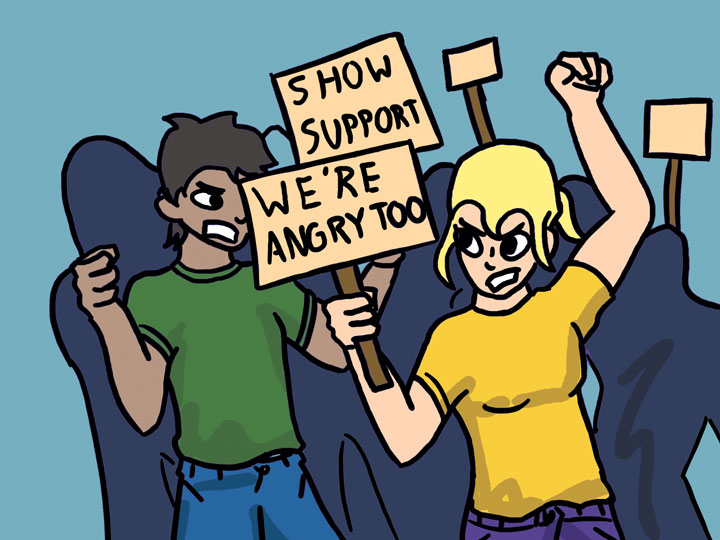
Protests create conversations
By Babur Ilchi, December 4 2014 —
Solidarity movements are important, but they’re often critiqued as a way for people to feel good about problems they can’t solve. Calgarians can’t change international politics by standing in front of city hall.
But solidarity movements, like this summer’s protests against Israel’s invasion of Gaza or last week’s gathering in solidarity with protestors in Ferguson, are more than a way to influence policy.
A group of people with signs outside city hall won’t change Israel’s foreign policy. A candlelight vigil won’t change how the police act in Ferguson. But they can start conversations about issues in Calgary.
We’ve been talking more about racism in law enforcement in the past couple weeks than in the last few years. At a city council budget hearing on Nov. 27, Calgary Police chief Rick Hanson spoke about police wearing body cams to assist with evidence-gathering and to defend against police impropriety. This probably isn’t a direct result of Calgary’s Nov. 25 protest in solidarity with Ferguson, but it shows that our actions have a context. The problems we face transcend geographic boundaries.
Shows of solidarity aren’t for people already in power. They’re for people who are fighting those in power. Protesting against Israel’s military operations in Gaza is irrelevant to the Israeli government. But to Gazan civilians facing war, these protests validated their struggle.
Knowing you have the support of people around the world helps when you’re directly involved in a conflict. Solidarity movements are so far removed from the original issues that they may not change policy by themselves. But they encourage and promote the less powerful side in any conflict.
The biggest issue with solidarity movements is that they require numbers. Efforts on campus to stand with Hong Kong students failed because there wasn’t enough interest. If you can’t get hundreds of people out on the streets, it’s difficult to convince the world that you care.
While major geopolitical issues usually get their time in the news, smaller events like Ferguson rely on solidarity to stay relevant. When black teenager Michael Brown was pursued and killed by white police officer Darren Wilson, protests around the world kept conversations about race and police violence part of the public discussion. Without a large reaction, Ferguson is easy to ignore.
Solidarity protests are more than a way to lobby governments. People in power have experience ignoring things they don’t want to acknowledge, including people in the streets.
We have to prove to each other that we care about important issues, even when they don’t directly affect us. Solidarity is about supporting each other and keeping issues we care about at the forefront of public discussion.
